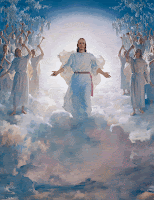
Part 3 of 3
We've recently seen an introduction to this great "firstborn" design that God has instituted and set forth throughout Scripture. We've discovered what it means to be a part of the "church of the firstborn" (Heb 12:23). We have also seen the identity of such firstborn-ones: They are not natural seed, but spiritual seed - those born from above, by the Spirit. Amazingly, the natural firstborn was often replaced by a son who exemplified a greater surrender to the Holy Ghost.
Finally, I want to address the fruit of this identity. What is the effect of being a New Covenant firstborn? In addition to his being set apart, what else does he receive? In short, the firstborn son receives the birthright! If you have been born from above, by the Spirit, then you ARE a firstborn, joined to God's "church of the firstborn" (Heb 12:23)! And if you indeed are a firstborn, then you are to possess a firstborn blessing - the birthright!
The birthright has several significances. We must keep in mind, however, that this is a spiritual birthright, a greater and more significant birthright, not a mere natural one. It is a spiritual inheritance given to the firstborn sons of God, not a natural one. It simply cannot be over-emphasized that what was a natural transference upon the firstborn in the Old Testament, is to be a spiritual transference upon the "church of the firstborn" in the New Testament.
By searching the Scriptures, we can determine that the firstborn birthright contained at least 5 blessings:
(1) the priestly ministry
(2) the kingly ministry
(3) the prophetic ministry
(4) the double portion ministry
(5) the bruiser of the serpent's head
Any and all of these promises made to the firstborn are to be ours too, as we partake of God's calling as the church of the firstborn, or the "church composed of firstborn sons".
Observe...
- All throughout Scripture, the firstborn birthright is attributed to the ministry of the priesthood. In Numbers 3:40-46, God chooses to take the tribe of Levi to be His, instead of all the firstborn of Israel. In effect, this makes Levi a firstborn tribe unto the Lord! Later on, Moses confirms that the priesthood ministry is part of the birthright given to Levi (in Genesis 49), even though he was the third-born son: "And of Levi he said...They shall teach Jacob thy judgments, and Israel thy law: they shall put incense before thee, and whole burnt sacrifice upon thine altar" (Deut 33:9-10). Furthermore, interestingly enough, there were many firstborns (in God's eyes) who were priests as well. Noah was a patriarchal priest unto God (Gen 8); he offered sacrifice to God at the time of covenant. Job was a patriarchal priest as well, offering sacrifices unto God for his family (Job 1:1-5). Abraham, Isaac and Jacob were also priests unto God. They built altars unto the Lord, and called upon Him (Gen 12-50). Each of these men are "firstborn" in the mind of God. The very fact that these patriarchs were covenant men who built altars, offered sacrifices, and called upon the name of the Lord shows that they exercised priestly ministry! We can see, therefore, the clear relation between the firstborn sons and the priesthood ministry. The New Testament application is obvious! The New Testament "church of the firstborn" is to be composed of such priests: all born again believers are to be "priests unto God" (Rev 1:6; 5:9-10; 1 Pet 2:5-9; Rom 12:1-2). Every believer is called to be a ministering priest: This is part of the believer's birthright - priestly ministry unto the Lord!
- Secondly, the firstborn birthright includes the rule of kingship! Kingship speaks of ruling and reigning; it speaks of authority and power over all the enemies of the kingdom. The New Testament application is so clear! Just as such a "kingly label" was offered to Israel (God's firstborn) in Exodus 19:1-6, so is it now presented to the spiritual Israel of God, the church of the firstborn, by Jesus Christ (1 Pet 2:5-9). Additionally, notice the kingly designation that is attributed to God's chosen firstborn after the Spirit: Kingship was promised to Abraham (Gen 17:6), to Jacob (Gen 35:11), and foretold by Moses (Deut 17:14-20). Furthermore, Judah (who received a portion of the birthright from Jacob) was given the prophetic birthright blessing of kingship rule: "The sceptre shall not depart from Judah, nor a lawgiver from between his feet, until Shiloh come; and unto him shall the gathering of the people be" (Gen 49:10). This scepter speaks of rulership, dominion, victory, headship, government, etc. These have become spiritual truths transferred to the New Covenant firstborn believer! The two offices of king and priest have been brought together in the person of Jesus, and in His church. Jesus is the King-Priest after the order of Melchizedek, and the church, that is, the church of the firstborn ones, is called to partake in that same order (Heb 7)!
- Next, the prophetic ministry is also to be the inheritance of God's New Covenant firstborn. In the eleventh chapter of Hebrews, we see a list of the "Heroes of faith". It is important to understand that these men were firstborn after the Spirit; they were firstborn of God (as we have seen yesterday). To them were given portions of the firstborn birthright, one of these being the prophetic spirit. Notice the deep relation that these men had concerning the prophetic: Adam had the prophetic Spirit resting upon him when he prophesied concerning his wife, Eve (Gen 2:23-24; Eph 5:31-32). Noah possessed this prophetic Spirit also. He foretold the coming judgment by the flood. Enoch prophesied concerning the second coming of Christ (Jd 14-15). Abraham was actually the first person in Scripture who was labeled as a "prophet" (Gen 20:7). Isaac certainly had this same prophetic Spirit upon him when he prophesied over Jacob and Esau of things to come (Heb 11:20). And the list goes on and on! Who can fail to see the significance here? Clearly, the prophetic Spirit is a portion of the birthright to be inherited! It has not dispensationally passed away, as so many are quick to assume. Rather, in the New Testament, God promises His Spirit to be poured out upon all flesh (Joel 2:28-32; Acts 2). Paul said that "all may prophesy" (1 Cor 14:31). All may not have the office of a prophet (Eph 4), but all may have the Spirit of prophecy upon them. There may be those who despise the prophetic Spirit, but they are in gross error. They, in a sense, are despising a portion of their very birthright! The church of the firstborn will have this Spirit in operation more and more. The testimony of Jesus is the Spirit of prophecy (Rev 19:10)!
- Fourthly, the church of the firstborn is to receive a double portion. Scripture is clear that a double portion was to be the inheritance of the firstborn under the Old Covenant (Deut 21:15-17). However, for us now, these truths have been elevated to a higher, and spiritual plane. The New Covenant right of God's church of the firstborn is a spiritual double portion! The firstborns (after the Spirit) that we have seen previously also received this facet too: Joseph received God's double portion for the firstborn, even though he was not actually Jacob's firstborn son (Gen 48:12-22). Interestingly enough, when Elisha asked for a double portion of Elijah's spirit, the margin reads "the portion of the firstborn" (2 Kgs 2:9). In other words, they are one in the same! I find it interesting that on the sixth day of the manna's appearance, God sent a double portion (Exod 16). In the sixth day (the day before the "day of the Lord") there was a double portion of heavenly bread! The obvious application to New Covenant believers is simply astounding! All of these pictures of the double portion are brought together for the "church of the firstborn"! There is a double inheritance, a double portion of the Spirit of God, and a double portion of the bread of heaven for the church in these last days! How could we ever despise such a birthright?! How sad that when Elisha hungered for a double portion (a firstborn portion) of Elijah's spirit, there were 50 religious men standing afar off gazing (2 Kgs 2:7, 15-18). They truly despised what could have been theirs! Nevertheless, God has His remnant. He has His Elisha's... those who will fervently keep their eyes on Jesus, seeking whole-heartily to possess this birthright! Dear reader, you can rest assured that the Spirit-ministry of the last day church will outweigh that of the early church, even as a double portion outweighs a single. The early and the latter rains will combine, and the floors will overflow with "corn, wine and oil" (Joel 2:19, 23-24)! This glorious church's birthright is a double portion of rain, and a double portion of harvest! Hallelujah!
- Lastly, we see that the final portion of this firstborn birthright is that which pertains to the bruising of Satan's head: "And I will put enmity between thee and the woman, and between thy seed and her seed; it shall bruise thy head, and thou shalt bruise his heel" (Gen 3:15). Once again, the seed that was to bruise Satan's head would come through a firstborn: Abel was Eve's prophetic seed, but was replaced by Seth when he died (Gen 4:25). This "seed promise" continued on, by God, through Noah (Gen 8-9). They were confirmed to and through Abraham, Isaac and Jacob. In Genesis 49, this seed line was narrowed down to Judah, who was also a "firstborn" in the mind of God. His was the line from which the Messiah would come. Upon Jesus' arrival, perfect life, death and resurrection, the serpent's head was surely bruised. How wonderful it is for us, however, that God has reserved Satan's final defeat to be partnered with His firstborn church! In other words, Scripture shows us that it is Christ AND His church together who bring about the ultimate bruising of Satan! It's an inheritance of the firstborn! This is confirmed by Paul: "And the God of peace shall bruise Satan under your feet shortly. The grace of our Lord Jesus Christ be with you. Amen" (Rom 16:20). What a glorious birthright that will be given to the overcomers!
Beloved, how could a mere mess of pottage even compare to such things!? Let's not be foolish as Esau was. Let's never despise such a precious and bountiful birthright! Rather, let's lovingly grasp hold of this firstborn promise, run with it, and overcome! Amen.
For a more detailed study of this glorious theme in Scripture, check out this book from Amazon.com.










